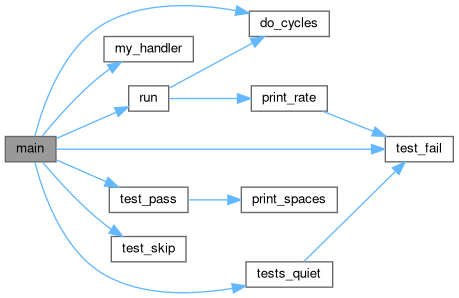Loading...
Searching...
No Matches
Include dependency graph for child_overflow.c:

Go to the source code of this file.
Macros | |
| #define | MAX_EVENTS 3 |
Functions | |
| static void | my_handler (int EventSet, void *pc, long long ovec, void *context) |
| static void | print_rate (const char *str) |
| static void | run (const char *str, int len) |
| int | main (int argc, char **argv) |
Variables | |
| static int | Event [MAX_EVENTS] |
| static int | Threshold [MAX_EVENTS] |
| static struct timeval start | last |
| static long | count |
| static long | total |
Macro Definition Documentation
◆ MAX_EVENTS
| #define MAX_EVENTS 3 |
Definition at line 18 of file child_overflow.c.
Function Documentation
◆ main()
Definition at line 95 of file child_overflow.c.
96{
101
102 /* Used to be able to set this via command line */
103 num_events=1;
104
105 /* Set TESTS_QUIET variable */
107
108 do_cycles( 1 );
109
110 /* zero out the count fields */
111 gettimeofday( &start, NULL );
113 count = 0;
114 total = 0;
115
116 /* Initialize PAPI */
120 }
121
122 name = argv[0];
124 printf( "[%d] %s, num_events = %d\n", getpid(),
126 }
127
128 /* Set up eventset */
131 }
132
133 /* Add events */
138 }
139 }
140
141 /* Set up overflow handler */
145 != PAPI_OK ) {
147 }
148 }
149
150 /* Start the eventset */
153 }
154
155 /* Generate some workload */
157
160 }
161
162 /* Stop measuring */
165 }
166
169 }
170
171 test_pass(__FILE__);
172
173 return 0;
174}
static void my_handler(int EventSet, void *pc, long long ovec, void *context)
Definition: child_overflow.c:36
add PAPI preset or native hardware event to an event set
Create a new empty PAPI EventSet.
initialize the PAPI library.
Set up an event set to begin registering overflows.
Start counting hardware events in an event set.
Stop counting hardware events in an event set.
void PAPI_NORETURN test_fail(const char *file, int line, const char *call, int retval)
Definition: test_utils.c:491
void PAPI_NORETURN test_skip(const char *file, int line, const char *call, int retval)
Definition: test_utils.c:584
Here is the call graph for this function:

◆ my_handler()
Definition at line 36 of file child_overflow.c.
37{
38 ( void ) EventSet;
39 ( void ) pc;
40 ( void ) ovec;
41 ( void ) context;
42
43 count++;
44 total++;
45}
Here is the caller graph for this function:

◆ print_rate()
|
static |
Definition at line 52 of file child_overflow.c.
53{
54 static int last_count = -1;
56 double st_secs, last_secs;
57
58 gettimeofday( &now, NULL );
63 if ( last_secs <= 0.001 )
64 last_secs = 0.001;
65
67 printf( "[%d] %s, time = %.3f, total = %ld, last = %ld, rate = %.1f/sec\n",
70 }
71
72 if ( last_count != -1 ) {
75 exit( 1 );
76 }
77 }
79 count = 0;
80 last = now;
81}
Definition: papi_fwrappers_.c:1278
Here is the call graph for this function:

Here is the caller graph for this function:

◆ run()
|
static |
Definition at line 84 of file child_overflow.c.
85{
86 int n;
87
88 for ( n = 1; n <= len; n++ ) {
89 do_cycles( 1 );
90 print_rate( str );
91 }
92}
Here is the call graph for this function:

Here is the caller graph for this function:

Variable Documentation
◆ count
|
static |
Definition at line 33 of file child_overflow.c.
◆ Event
|
static |
Initial value:
= {
}
Definition at line 20 of file child_overflow.c.
◆ last
Definition at line 32 of file child_overflow.c.
◆ Threshold
|
static |
Initial value:
= {
8000000,
4000000,
4000000,
}
Definition at line 26 of file child_overflow.c.
◆ total
|
static |
Definition at line 33 of file child_overflow.c.